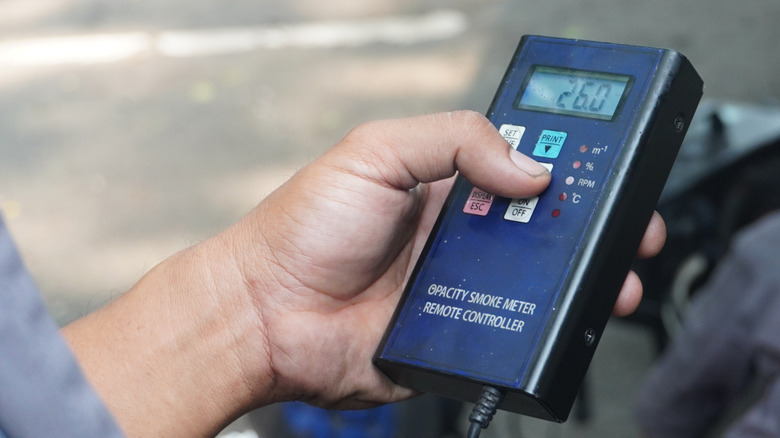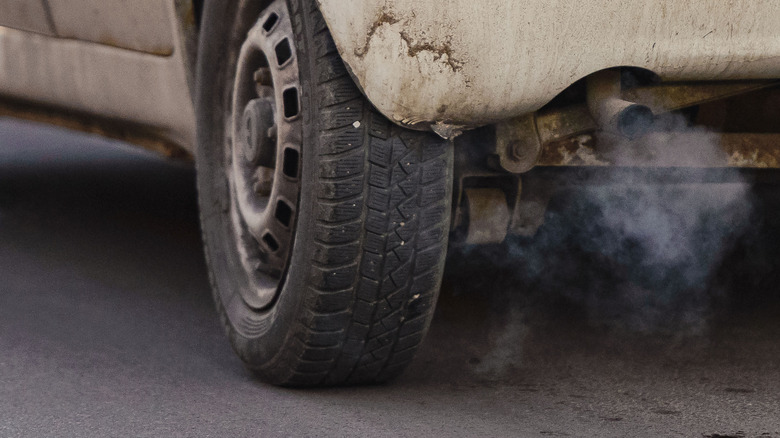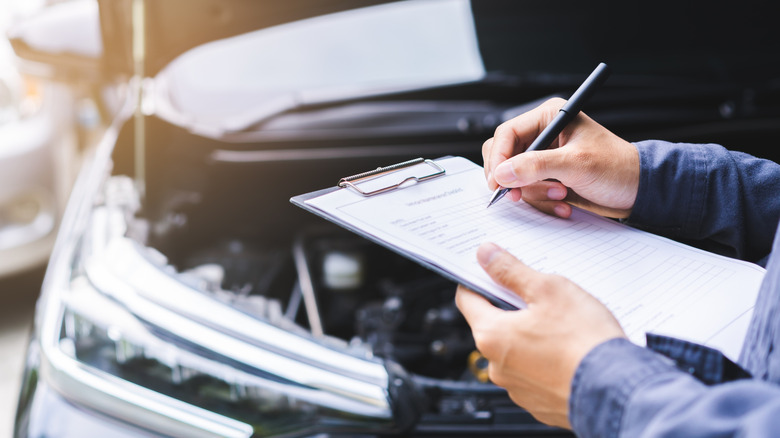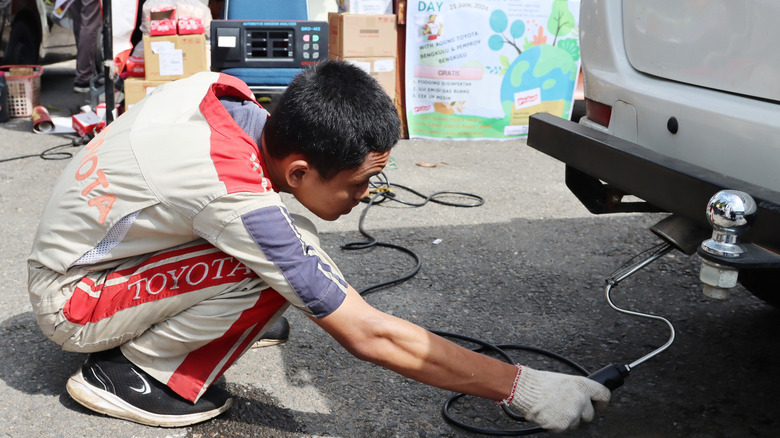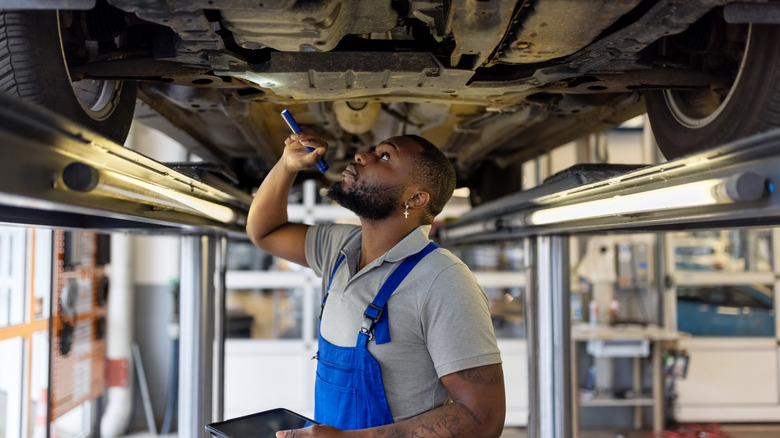These States Don't Require Regular Car Inspections
Emissions testing and vehicle inspections are standard practices designed to promote and maintain road safety as well as reduce environmental pollution. Emissions testing in the U.S. measures the pollutants a car emits so that vehicles comply with federal air quality standards. Vehicle inspections assess a car's overall condition by checking components like brakes, lights, airbags, tires, and more. Together, these procedures help keep vehicles safe for drivers, passengers, and even pedestrians, while also minimizing their health and environmental impact.
Yearly or periodic vehicle inspections are mandatory in many states, serving as a preventive measure to catch issues before they lead to accidents or costly repairs. They also play a key role in reducing air pollution caused by older or malfunctioning vehicles. According to the Environmental Protection Agency, cars, trucks, and buses are the largest contributors to greenhouse gas emissions, which cause climate change.
However, some states have chosen not to impose regular emissions testing and inspections on their residents. This raises questions about the potential risks and responsibilities for car owners in these states.
States without regular emissions testing and car inspections
Nearly half of the states require neither emissions testing nor regular vehicle inspections for registration or annual tag renewals. According to Kelley Blue Book, the list includes Alabama, Alaska, Arkansas, Florida, Idaho, Iowa, Kansas, Kentucky, Michigan, Minnesota, Mississippi, Montana, Nebraska, North Dakota, Oklahoma, South Carolina, South Dakota, Tennessee, Washington, and Wyoming. Residents of these places enjoy the convenience of not having to go through the procedures, saving them time and money.
However, in certain states that don't require other testing, authorities order car owners to undergo a vehicle identification number (VIN) inspection, especially if they are bringing in an out-of-state automobile and want to register their vehicle for driving in the area. This is the standard for Alabama, Florida, Idaho, Kansas, Montana, and Nebraska.
There are other requirements in some non-testing states, too. In Alaska, residents are obliged to have active car insurance if they want to drive a car. In Kentucky, a car brought from out of state must be inspected by a sheriff for safety. And in Arkansas, the state encourages emissions testing, even though it's not mandated.
States with vehicle inspection but no emissions testing
Only a few states require vehicle inspection but not emissions testing. Hawaii, Pennsylvania, and West Virginia belong to this category. In the Aloha State, car owners are obliged to pass periodic inspection to ensure their vehicles are safe for driving. Authorized stations facilitate the process that involves checking cars's components and safety features, including the brakes, turn signals, headlights, and horn.
Meanwhile, even though Pennsylvania does have mandated emissions testing, this is only applicable in the Pittsburgh and Philadelphia areas, as well as in scattered counties in the rest of the state. According to Drive Clean Pennsylvania, 42 counties in the state do not follow this vehicle registration requirement and instead ask for only a basic car inspection every year.
The same goes for West Virginia. The only difference is instead of having it annually, Mountain State vehicles are instructed to undergo a safety inspection every two years.
States with emissions testing but not vehicle inspection
A number of states have mandated emissions testing but not vehicle inspections. This list includes Arizona, California, Connecticut, Georgia, Illinois, Indiana, Nevada, New Mexico, Ohio, Oregon, Texas, and Utah.
California strictly implements a smog test for new vehicles, and every other year for already-tested cars. In Connecticut, passenger cars need to pass an emssions test every two years.
Some states require emissions testing only in certain regions. Nevada requires testing yearly in the Reno and Las Vegas areas. In Illinois, only car owners in the Chicago and East St. Louis areas must be tested. In Oregon, residents of the Portland and Medford areas must get emissions testing; in Ohio, it's people who live in and around Cleveland; and in Georgia, it applies only in and around Atlanta. Indiana has testing every two years for cars in the counties near Chicago, New Mexico in the Albuquerque area, and Utah in Salt Lake and several other counties for newer cars. In most of these cases, there are exemptions for newer-model cars as well as those a quarter of a century old or older, depending on the state.
Texas is the latest to join this list, since it abolished safety inspections as a registration and renewal requirement on Jan. 1, 2025. It requires emissions testing in the Houston, Dallas, Austin, and El Paso areas; the San Antonio area joins the list on Jan. 1, 2026.
States with both emissions testing and safety inspection
Colorado, Delaware, the District of Columbia, Maine, Maryland, Massachusetts, Missouri, New Hampshire, New York, North Carolina, Rhode Island, Vermont, Virginia, and Wisconsin require both emissions testing and safety inspection, though emissions testing applies in Missouri only in the St. Louis region, in Maryland only in the Baltimore area, in Maine only the area around Portland, in Virginia only near Washington, D.C., and in Colorado only in Denver, Broomfield, Douglas, and Boulder counties. Some of these states — Maine, Massachusetts, New Hampshire, New York, North Carolina, Vermont, and Virginia — require yearly inspection and testing, while Colorado, Delaware, Maryland, Missouri, Rhode Island, and Wisconsin demand car owners have the tests every other year.
Going through both emissions testing and vehicle inspection can be tedious, especially on days when too many people are at the testing sites. So the lack of regulation in other states can become alluring. However, this lax approach to regulating cars also comes with downsides. Without mandatory inspections, the risk of unsafe or heavily polluting vehicles operating on the roads increases. The U.S. Government Accountability Office says that in states where inspections are mandatory, a large number of vehicles fail testing and must undergo necessary repairs to pass the retest. Nevertheless, research data is inconclusive in discovering whether states without inspection programs record more accidents and fatalities.
What car owners must do in states without strict regulations
For car owners in states that do not mandate regular vehicle inspections and emissions testing, the best thing to do is to take proactive steps to ensure their vehicles remain safe and less hazardous to the environment. Taking responsibility by scheduling routine car maintenance, such as oil changes, brake checks, and tire rotations is vital to keeping a vehicle in good running condition. Many auto repair shops offer comprehensive vehicle checkups that can help identify potential issues before they become major problems. Some also offer emissions testing for faster detection of mechanical issues that lead to bigger gas emissions.
Even if testing is not required, drivers should ensure their vehicles meet basic environmental standards. This can be done by maintaining the exhaust system, using high-quality fuel, and promptly addressing dashboard warning lights. Regular maintenance not only extends a car's lifespan but also contributes to cleaner air and a safer driving environment.
Ultimately, while living in a state without mandatory inspections might seem like a relief, it actually places greater responsibility on drivers. By prioritizing regular maintenance and addressing potential issues early, car owners can play their part in promoting road safety and environmental sustainability, regardless of state regulations.
